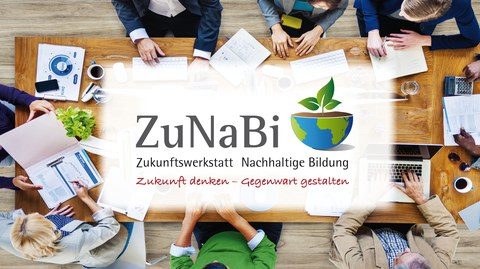Project idea
Future Workshop Sustainable Education (original: ZuNaBi)
Thinking the Future – Shaping the Present
Initial situation
Sustainability is a key issue for the future. People who initiate change in their professional and social environment are the basis for future transformation processes in a sustainably oriented sustainable society. Education has a central role to play in this respect. The planned Future Workshop on Sustainable Education addresses precisely this issue. Additionally, it aims to make a decisive contribution to the sustainability strategy of the TU Dresden and the Free State of Saxony.
Aims
A Future Workshop on Sustainable Education brings together students and lecturers/teachers, scientists and practitioners, and people from different disciplines to advocate for sustainable development and education. The main objective is to deepen the implementation of Education for Sustainable Development (ESD) at the TU Dresden in the field of education and beyond. ZuNaBi is intended to be an inspiring place of encounter and exchange, and an innovative educational space. Within this space, sustainable thinking and action is creatively stimulated, deepened and inspired.
Content
The interior design of the ZuNaBi is to be divided into four areas:
- research on sustainability and ESD (research-based learning)
- basics and knowledge of ESD (personality development and value orientation)
- didactics at school and university (concrete implementation of educational offers with innovative methods)
- best practice examples of sustainable education (project work)
Innovative character
For the first time at a German university, a learning and research workshop is being established under the motto “Thinking the Future – Shaping the Present”. This workshop on the future-oriented topic of ESD will not only be interdisciplinary but also inter-institutional and cross-faculty/inter-teaching. With this new sustainable educational space, the Free State of Saxony and the TU Dresden are pioneers in all phases of teacher training. The phases are as followed: first phase (studies), second phase (preparatory service) and third phase (in-service and further training). Moreover, this educational space will be pioneering in qualifying teachers for this important area of education. For all types of schools. Furthermore, the multi-professional and interdisciplinary approach provides an opportunity for a variety of ESD actors to come together to generate and implement new approaches to sustainable education. In this way, teaching, research and practice are synergistically interlinked within the framework of sustainable education. Thus, a cycle of thinking and research is created which is intended to have a direct impact on the actions of educational actors as multipliers and change agents in their respective institutions.
Place of implementation
In the building of the Faculty of Education, initially at Weberplatz 5 - after the faculty has moved: Münchner Straße 1.
Features
-
Education as a key variable - Education for Sustainable Development for students, lecturers and teachers (in-service and further training) through expert lectures and workshops on ESD
-
Interdisciplinarity - thinking, developing and acting in multi-professional teams and developing interdisciplinary research and development projects
-
Networking (retinity) - connecting different perspectives and finding creative ideas and ways of thinking (see/cf. BNE University Network Baden-Württemberg)
-
Finding and generating knowledge - a specialised library at the TU Dresden with important knowledge resources on Sustainability and Sustainable Education in one place
-
Development of schools - profiling of schools in Saxony ("Educational landscape of Saxony 2030")
-
Aspects of education policy - the future role of curriculum development
-
City of Dresden and sustainability - non-university projects and external impact
Start of the project
2022/2023
Award
Winner of the "eku - ZUKUNFTPREIS 2022" award
Project management
Prof. Dr. Martina Knörzer |
Dr. Lars Förster |

